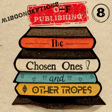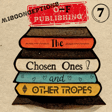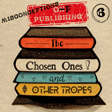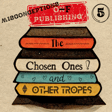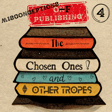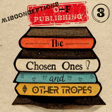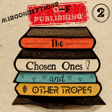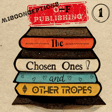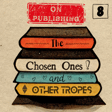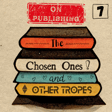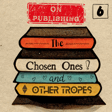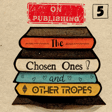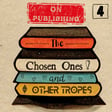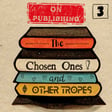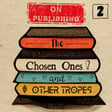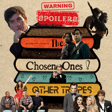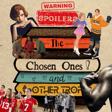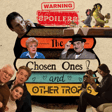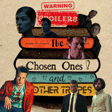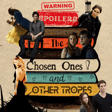Become a Creator today!Start creating today - Share your story with the world!
Start for free
00:00:00
00:00:01

S4.E1 - Writing Your First Manuscript
This season, we're diving into the many myths and tropes of publishing a novel. From inception to writing, to querying agents, working with editors, and all the way through to publication. We're covering everything we've heard and learned about publishing.
- Naomi Gibson, author of Every Line of You, Game Over Girl
- Melissa Welliver, author of The Undying Tower, My Love Life and the Apocalypse, Soulmates and Other Ways to Die
- Jamie Greenwood, creator & host of the Write and Wrong Podcast
Transcript
Exploring Tropes and Originality in Publishing
00:00:00
Speaker
Do you reckon Christian Grey is different characters? Whoa! You heard it here first. I'm so finished it. After every episode was like, oh my gosh, I'm so angry at these toxic characters. Like, she'll have more food in my mouth, press next episode. Because I loved it, but obviously I hate it. This is so much fun. Because this is my Malfoy
00:00:36
Speaker
We're back for a new season and we're going to try something a bit different this season. We're going for tropes within publishing. So things that people talk about when they talk about the different stages of publishing and like the tricky parts, the not so tricky parts, stuff that's maybe like a bad ah advice that gets shared a lot or like good advice that isn't shared enough. That's what we're going to try and cover this season.
The Role of Book Reviews in Publishing
00:01:02
Speaker
Don't know how it's going to go, but we're going to have fun doing it. Let's start as we have been starting the last few episodes with ah my fun new one-star review thing. Let's see if Naomi and Melissa can guess this one. This is a fun one. um Too many sexist white men. Rick Riordan tells Greek mythology better.
00:01:24
Speaker
but What book is that a review for? I'm scared. i I've got to say that could be any number of books. but There are so many Greek like myths. off there i'll I'll tell you guys, it's very famous. Is it like, um, is it like Madeline or one? Is it Cersei or something? No, it won't be. Yeah. I was thinking, is it a song of Achilles? But then I don't think it is that. I would say more famous.
00:01:50
Speaker
Really? Yeah, because those are like white feminists. That's what I was thinking. You've got to decide as well whether the one-star reviewer is just super riled by a feminist retelling. I was going to say something opposite, whether they're being completely serious. it Too many sexist white men. Rick Ryan tells Greek mythology better. Oh, is it it um that Neil Gaiman one? No. I feel like you guys are not going to guess this. No.
00:02:17
Speaker
It is ah a review for The Odyssey by Homer. Oh, okay. Okay, that is quite famous to be
00:02:32
Speaker
That's great. oh Yeah. Another classic one, sorry. Okay, let's get on
The Myth of Complete Originality in Manuscripts
00:02:38
Speaker
to it. So episode one, we're going to talk about writing your first manuscript and the various different sort of things that people tell you and and advice that's shared and and that whole discussion.
00:02:51
Speaker
So we're going to try and kind of keep it in the same structure, even though these aren't really tropes in the same way that we've talked about them before, but we've all kind of picked a thing or like a vague area. um So let's start with Melissa because Melissa, you have been dealing with manuscripts recently in your, was it a competition that you're judging?
00:03:13
Speaker
Yeah, so I judge like a lot of competitions that we run through right mental. So i' when I say judge, like that makes it sound like I'm choosing who wins. I do not choose who wins. We usually have a super professional agent or editor to do that. ah But we do have readers, and I'm one of the readers that read anonymously to sort of ah bring it down to a long list or a short list to pass on to me, judge. So you what have you chosen based off your recent experiences?
00:03:43
Speaker
Yeah. So essentially when you're a reader, what's interesting is, so, you know, we we pay our readers and you have a list, you have a ah spreadsheet with all of your assigned ah reading. Obviously it's anonymous. and I guess every now and then I might recognize something. I say edited, I just swap it with another reader and that's fine. But what's really funny is it's all in a big row and all it is, is alphabetized by the first word of the title.
00:04:06
Speaker
that's it. So you're reading everything just in a completely random order. But I mostly look at the teen and YA. What's interesting, and this is what made me pick it, is sometimes you think something is a really cool original idea. And then once you've read 10, you realise you've read it three times. And so my like, sort of, I guess trope or maybe thing I want to debunk is the my manuscript is completely original, which I think it's something everyone thinks when they write a manuscript and I guess the problem is, as I'm talking through this, I i think of it as like shroding as manuscript. It both is and is not to be the original. so true And that is part of the problem but also part of what's actually probably good about it. So as an example, I was reading, I won't say anything about um this year's judging, but in previous years, for instance, I once had one where I read about um somebody who has a love interest that is like a tree or a tree spirit.
00:04:58
Speaker
house was I was like, this is fun and interesting. And then I read three more in my batch with tree spirit, love interest in the same in the same competition, in the same year, so strange. Or I had one one year where um several of the manuscripts I was reading opened with a drowning.
00:05:18
Speaker
like So this is YA, so it's not like, you know, we're talking YA, but it's still like, ah it was bizarre. And also, interestingly, I remember that, was it that specifically that year, or maybe the year before, there'd been a couple of books I'd read that were thrillers that had opened with The Drowning, like one of them was Cynthia Murphy's book. And I think,
00:05:35
Speaker
Farida did a book like that and so it's basically I didn't know if people were maybe not copying necessarily but sort of subconsciously trying to emulate what they think of as a really exciting opening. yeah um So yeah sometimes you do end up with quite similar things so then you might be thinking well then that's really annoying because there's that old phrase like nothing is original.
Balancing Familiarity and Originality in Manuscripts
00:05:56
Speaker
Nothing is original. um Nobody is allowed to come up with any original ideas because we've lived for 2,024 years past Jesus's birth. I don't know. There were probably books before that, but I'm talking like post-publishing really has only been about 300 years probably, hasn't it? Three, 400 years. And ah there so there's no original stories left because they've all been told.
00:06:14
Speaker
And yes, that is kind of true. However, it's not as scary as it seems. So I think the problem is a lot of agents that we have on Unright Mental talk about um the importance of a manuscript being familiar with an original twist.
00:06:29
Speaker
that's like a really common thing that they ask for. So they'll say like, what are you asking for? And blessed though, always apologize. like I know this sounds really vague, but we're looking for something familiar with an original twist. And all that really means is if you wrote something truly original, like if you asked a genie for a wish, because trust me, you will not, you will not. And that's fine. That's what we're learning. It's fine not to be completely 100% original. And you did come up with something like that. It would basically be either unreadable or unsellable or both. Because yeah when people are looking for something,
00:06:58
Speaker
I see it all the time. People, you know, nip on social media and they say, i my ah reluctant teenage son or daughter has just read The Hunger Games and loved it. Can anyone recommend something similar because they're really in that vibe right now for death games or for, you know, thriller or something like that?
00:07:14
Speaker
And if you don't have other stuff on that list that you can compare your book to, then it becomes incredibly difficult to sell because if somebody has a book is huge. It's not like me showing you a photograph to see if you would like it and it might be a bit original. We're talking about can you invest hours of your time reading this thing to find out whether it's original. So I think sales are even more important because it's such a long form item and that requires hours of time.
00:07:38
Speaker
you have to find a way to tell them, oh, it's a bit like this with a pinch of this. That's a very common way to pitch a book, right? So no manuscripts are completely original. But what I will say is that every book that's written by you is original. It sounds so cheesy, as I'm saying. But it's true. true. Yeah, it's your voice. Your voice will be what makes it original. And so if you're telling, so we were just talking about with myth retellings, literally at the beginning of the show. We were like talking about that. And ah then I made a joke like, gosh, there seems to be so many at the minute. But that doesn't mean they're not selling and it doesn't mean that they're not great. It's in fact, if you're really into Greek myth,
00:08:15
Speaker
myth retell is you must be having a fantastic time on your Goodreads aims of the year. Like you must be absolutely hammering out those books and that's great, like awesome. I really love dystopian stuff. So when dystopia is having a boon, like I'm like, yes, I just like inject it in my veins. I've won it all the time. So and other people might read those and say like, Oh, this is quite samey to The Hunger Games or whatever it may be. But that's exactly what would attract me to it.
00:08:38
Speaker
So yeah, it's the voice that makes something original and each person has their own unique individual viewpoint on the world, the way that they write, the way they describe things, and that's what makes something original. So yeah, that's my very long. In conclusion, thank you for coming to my dental. My MS is completely original. It both is and is not completely original. yeah Yeah. It's funny that this is what you're talking about. I literally interviewed last week, I interviewed Phoebe Morgan, who's a publishing director at Hodder & Stoughton. And I was talking to her about commissioning and what she looks for as an editor when she's looking to commission a new book. And she talked about this at length. She was like,
00:09:18
Speaker
I think you need to not get caught up in this sort of originality of this sort of plot because especially if you're writing, you know, she's the commercial publishing director. So she's writing, she's looking for books in the commercial um genres. So we're talking about like crime, romance.
00:09:35
Speaker
These are two of the like most thriving genres in the industry. But for most of them, you kind of before you've even picked up the book, you know what's going to happen, right? You know in your romance novel that it's going to be happily ever after at the end. Always. You you you know probably in your crime novel, there's going to be like a Florida detective who's going to solve the case that no one else could solve.
00:10:00
Speaker
that's it's good But it's also what the readers want. yeah So like if you wanted to write, let's say a crime novel, readers wouldn't want to read something where you totally subvert that formula. And if you did do that and it was published, it probably wouldn't be marketed with other crime novels. It would be marketed in literary fiction maybe or like in a sort of abstract sense.
00:10:25
Speaker
yeah So i yeah, I think it's but totally true. And like, yeah, listening to, if if anyone tunes into the Right Room podcast and listens to that episode with Phoebe, she goes into like great detail about the importance of voice over kind of like necessarily a totally original plot or a totally original twist.
00:10:44
Speaker
I think voice is definitely um what makes everybody original. I think that's out out of of everything you said, Malia, but I agree so strongly with the fact that your voice is is so original. Like if if you gave the same idea to five different writers, they would all write it a different way.
00:11:03
Speaker
And it's not it's not necessarily the idea um that you come up with that is the original, that there's a selling point almost for your books sometimes. it's It's the way that you tell a story. It's the way that you unfold it. It's the way that um you put it on the page and it reads. Yeah, that's what's most important, I think. yeah yeah Yeah, exactly. And I think like when you're writing your first manuscript,
00:11:26
Speaker
think you really panic if you realise, quote unquote, suddenly that it's not original. So I think when you're writing at first, you might feel really confident, you're really pleased with it. If you finish the whole flipping thing, especially you're like, wow, my gosh, I wrote a whole book. You might not necessarily, as an example, now I'm a few books in something I will often Google,
00:11:45
Speaker
is um a title. So if I come up with a title, I think it's really cool. I will just check. This hasn't been used, has it? Because I will just assume it's been used before. And so you don't necessarily do that either with plot points. Like you might just think you've come up with this amazing idea, you write it down, it's great. And then I i know so many people I yeah do mentoring and clients who worry because they say, Oh, this book's just been announced. And it's also at a magic university and mines at a magic university. and Oh, it's too similar. And they get really worried and like panicky about it. You really don't need to be in fact, if anything that will show there is a market for your book as well. yeah You don't poll just eat, you know, one type of sandwich or one flavor of chocolate, like we we eat lots of different things around that genre. And so I think sometimes people panic too easily.
00:12:30
Speaker
That's a bit mean. But people panic too quickly when they hear that there's another book that's similar to theirs, whereas actually, if anything, I would always say that's always a good thing. Also, it feels like almost a law of the universe that you'll start writing something when you're about 40,000 words in, something will pop up on your newsfeed and they're like, the exact book you're writing just got announced.
The Evolution of Genres and Trends
00:12:51
Speaker
Yeah, pretty much. It happens so much. It goes the other way as well, where people think this is totally original. There's nothing else like this on the shelf, and I'm very sorry to say that there is. Yeah, there is always something similar. And again, that's not a bad thing. No, I think that's good. You need an appetite already there. Of course books are written and they break through. And as Jamie said, usually literary genre, if we can even call that a genre, it almost feels like a funny genre to say, because is it literary and if it wins a prize, I don't really know what creates these genres. I'm not in charge of that, thank God.
00:13:27
Speaker
But I think sometimes you write something that is really original and those things do break through and create a whole new um Like tidal wave. Yeah of other books and that's him. So for instance cozy fantasy you know, yeah Travis Baldry, like that that whole thing, it was quite an original idea. Don't get me wrong, of course, there's parts of it that are really familiar, like fantasy elements and, you know, ah types of fancy creatures and that kind of stuff. But the actual putting together is a fairly original concept. The reason it works is it had familiar elements. But oh, no, what was it? No, what was it? It's in the back of the book, like the last few pages, and I'm pretty sure he pitched it as a Hallmark movie set in the Dungeons and Dragons universe. That's so cool. This meets this. It's so clever. So it's still got those familiar elements, but it is still quite original. That's what you're looking for. Yeah. And and Richard Osman too. I mean, Cozy Crime. Yeah, Cozy Crime is so big. I'm how good this interview I did with Phoebe Morgan was the other day. We were talking about covers and um so Richard Osman, not the first person to do Cozy Crime, but
00:14:31
Speaker
no one can deny that it sort of, you know, that really blew up the genre. yeah And I was saying to Phoebe like, yeah, what's sometimes frustrating to me is you go into like a bookshop now and it's almost hard to tell what where the Thursday Murder Club series is because Cozy Crime has really blown up and they all seem to have a very similar um art direction for the covers. And really similar titles as well.
00:14:56
Speaker
Exactly. And I was kind of being, I was looking at it from a sort of cynical point of view. But me as a fantasy reader, I'm like, half the fantasy books are called a thing of this and this. yeah And that's just how it is. And I'm like, and so we, she was saying, yeah, but it's sort of like,
00:15:11
Speaker
if you think lots of crime novels have a certain style and aesthetic to them so you know as a crime reader that it's going to have like a sort of black and white dark broody picture with the big writing is going to be the title and the author's name at the top and it's always in a very blocky square writing.
00:15:27
Speaker
this Richard Osman thing. It's a new genre. It's kind of blowing up and it's kind of just figuring out its aesthetic for people who just want to read in that genre. yeah You know what I mean? These these things are not new, but they kind of are.
00:15:43
Speaker
I guess the genre wants to be able to access its audience easily, doesn't it? Like what you're just saying of crime. You know a crime novel when you see it. You know a thriller when you see it. Yeah, I understand why everyone's copying the ritual husband. Yeah. Because you know it's cosy crime. You know what to expect. And there's nothing worse than as a reader, you go into a bookshop, you buy a book, and then you get home and you're like, this is something totally different. This is not what I thought it was. This is not as advertised. Yeah, exactly. There was a reason. I understand why people get so annoyed with how genres are done. For instance, I know that it is an ongoing problem that if you are, say, a queer writer, your books, even though they're sci fi or fantasy might be shelved into a queer section as opposed to a sci fi or fantasy set. And I do understand that is absolutely still a problem. and I don't know how we fix that problem, but we do need genres because we do need to be able to sell to the reader without them reading the entire book before leaving the shop. So that's just not happening.
00:16:41
Speaker
I agree. For the same reason why a lot of authors, um if they want to write in a wildly different genre to something they've already been published in, will use a nom de plume. They'll publish that under a different name. Yeah, the marketing is important and in with that the originality so something familiar to help hook onto perhaps your original twist is equally as important and that can be shown through the marketing whether it be the genre or like you say the covers that go with that genre there's nothing wrong with that even if it's easy to be I mean yeah I know exactly what you mean Jamie like I can be really disparaging about things that I don't really read in but yeah I'm absolutely a hypocrite because the genres I like have all similar covers or all similar names and I'm like these are awesome
00:17:24
Speaker
He's way better, which is ridiculous because I totally understand why they do that. And what's cool about it, and this kind of affects, this ties into your covers too, is the genres are always kind of shifting and moving and mo with like with what's popular.
00:17:39
Speaker
ah when heart stopper kind of blew up. yeah There was a huge shift in the aesthetic of YA covers, and now a lot of them emulate that kind of cell shaded cartoony yep figures on the front, including cell mates.
00:17:56
Speaker
yeah psalmix and lovelife yeah i've noticed that yeah yeah that's definitely a thing i mean there's always something like for instance somebody was pointing out the other day a reviewer and their tweet blew up a bit that pretty much every book they'd been sent uh for reviewing in kidlet had a purple cover now i've got a book coming out in august with a purple cover and guess what color richard osmond's last was it was also purple and i'm like you know what Yeah, it feels like purple's having a moment, even stuff as small as that will be emulated. So please do not worry about your plot or character or something being emulated, because trust me, it's the latest of your worries in originality. Yeah, for sure. So interesting. And if anything, yeah, if you're successful, that's now going to be emulated.
00:18:38
Speaker
Yeah. Compared for people to copy you. Yeah, absolutely. Yeah. Imitation is the highest form of flattery, especially in traditional publishing. Yeah. And the the only things really, um like I said before, if if you do want to write something that is not, I don't think it will be totally might totally original. It's such a difficult thing to achieve. But yeah if you want to do something that is not in ah like whether whether it's to do with the structure or the like the the way that the novel is conceived, it's always going to get packaged into that literary fiction category. And since we're talking about covers, those are the books that get to have covers which can be
00:19:20
Speaker
unique and and kind of totally original. And you get something like um Tomorrow and Tomorrow and Tomorrow, which has like a really like weird kind of striking cover. And I wouldn't be surprised if we see things emulating that cover in the next like couple of years. Yeah, I agree.
00:19:38
Speaker
because that's done so well. yeah but yeah i mean it's Like you say, Schrodinger's ah writing this manuscript, it is original, but it's not original. I think it's that the key takeaway which I would go with is to say like don't get caught up too much on the originality of your plot because yet that so much has been written, so much has been so many stories have been told.
00:20:05
Speaker
you're going to cross over with lots of different things. And a lot of it, most of it comes down to the uniqueness of the voice and the characters and the kind of perspectives of that. But it's also why so many um very popular things right now it are fusions of other, that two genres fuse together. Like horror romance is one that I've heard of people talking about a lot recently. Obviously the cozy fusion with fantasy and crime has been very, very popular, but across the board, I think more and more people are kind of fusing these two genres because it's like, you can take two things that people are very familiar with. And then the fun part is like how they combine. Yeah. And trying to appeal to both audiences is quite fun. Absolutely. 100%.
Market Considerations for Writers
00:20:50
Speaker
also had a lot of agents on the right and wrong podcast. And one of the things that sometimes I'll ask what their pet peeves are in submission letters, and they will immediately sort of, a lot of them have said like, it immediately makes me concerned. If one of the things I read in the cover letter is you've never read anything like this. This is a totally unique, yeah, because, and it's not necessarily because like,
00:21:18
Speaker
Probably it's not. So that's, that they'll read it. ah Some of them have said it's almost worst if that is true. Because if you've sent them a completely unique thing that's never been told like that before, it's very difficult for them to sell that to a publisher because a publisher is looking for a category to put that into. So they're going to say, okay, well, how do we market this? You know, we have different categories, different groups, which for better or worse is, best better or worse is how it is. You know, that's,
00:21:47
Speaker
just how the industry works, it's good they're going to have to put it in a sort of avant-garde literary section of the publishing marketing space.
00:21:59
Speaker
ah yeah it can't exist anywhere else. No. Publishing loves to put things in boxes, don't they? And if you don't fit in a box, it's almost against you really. If you don't fit in an Amazon category, why are you even bothering? Yeah, which is why a lot of agents then go on and say, if that's something that you're thinking about with your submission,
00:22:21
Speaker
who think if you went into a bookshop, where would it make sense for your book to sit? What books would you put it like kind of in between? yeah And that can kind of that might then make you see where but where it does fit in the market.
00:22:37
Speaker
Yeah. As well though, saying, oh, this is really highly original kind of tells the agent that you don't read in your genre, I think. I was thinking that like lack of market knowledge ability is not usually a selling point. um I find like this it goes along with, you know, making sure that you're using little tips.
00:22:58
Speaker
ah Making sure that you're using books that were published recently. I know lots of people who will pick a really big book and it was published in 1995 and they don't actually realize, I mean, I don't realize how much time has passed since 1995. I'm pretty sure that was 10 years ago, however it wasn't, sadly. Yeah, so like making sure you actually know what's selling now, not what we're selling to a child who is now an adult is. Yeah. especially i left Yeah, yeah, yeah.
00:23:19
Speaker
part of it. So yeah, I think if you're saying it's completely original, always try and find trust me, if you think you can't find something that has even elements, character elements, world building elements, ah magic system elements with another book, there will be something. yeah Just keep looking. Yeah, yeah. Ask a friend here.
00:23:37
Speaker
Yeah, librarians are amazing. Ask a librarian, yes. Indie bookshops as well. Good idea. Yeah, like the example you gave earlier, it's like a parent saying, oh, their child loved Hunger Games. What else would you guys recommend me? My first thought would be something like Red Rising, which literally book one essentially has like a sort of Hunger Games style sequence is the kind of crux of of the first book, but then it goes into space and it's much more sort of sprawling. ands interesting um Like we were saying, there's a lot of similarities, but there's also so much different between those two series. Yeah, because you don't want to read the same thing over it. Of course, it's important to have some original elements because you don't want to pump out the exact same thing over and over, of course.
00:24:27
Speaker
Yeah. I guess a good comparison is like video games. Yeah. People are very excited to play the sequel to a popular game, but obviously they want it to be enough the same and enough different. You know what I mean?
00:24:42
Speaker
Yeah, they want to be able to play the same and use some of the same styles of gameplay and not have to spend hours on a tutorial learning a completely different set of ways to play, but also have some new elements that make it harder. um yeah They have to learn new things. Yeah. Yeah. Yeah. Yeah. Amazing.
00:24:59
Speaker
That was, ah I think we i think we we covered that one pretty thoroughly. Let's jump over to Naomi. Naomi, what did you
The Pursuit of Perfection in Writing
00:25:09
Speaker
decide? You want to talk about this? I was thinking about this and and I was thinking how you've just finished um your first manuscript, which is such an achievement. and you know Getting to the finish line and actually completing a novel is something a lot of writers fail at, you know, I mean, I'm guilty of that. I've got loads of books that I haven't actually finished writing. i So you've you've actually finished one. And that's amazing. and And my trope that I'm going to pick today is that you think it's perfect. So my trope is my manuscript is perfect. So um
00:25:44
Speaker
ah I mean, I'm gonna talk quite personally here because I don't want to name names.
00:25:51
Speaker
oh So, you know, personally feel it speak personally speaking, ah finishing a manuscript gives me, you know, such a feeling of accomplishment and like I've just achieved this really big thing. and And at that moment in time, you know, having just written the end, I'm probably aware that there's like a couple of things wrong with it. And but I'm on such a high that you know what, there is absolutely nothing wrong with it it is absolutely perfect. If it got sent to the printers now, it'd be fine. You know,
00:26:22
Speaker
um And it's just like not the case.
00:26:27
Speaker
and and it don't um I right? My first draft isn't perfect. And and I think what um a lot of writers, ah particularly young writers, new new writers struggle with is knowing when your book is actually finished and when you're ready to take it to the next step.
00:26:47
Speaker
And because you have written a book and because that is such an achievement, um you know, you're kind of raring to go, you're, you're wearing to start querying, you're, you're ready to dive into um query trenches and find your perfect agent and go onto a publisher and get it printed and hold it.
00:27:03
Speaker
And there are just, and unfortunately, there are just so many steps in between that, and I'm really sorry to have to burst your bubble. and ah so and So someone in my family um ah was talking to one of their friends, and their friend's a writer, right? And my this person in my family said, oh, my daughter's um a published author maybe they can help you and you know I had this I then had an email from this friend going hello um apparently you can help me get published I've written a book and it's it's ready it's finished it's ready to go to the printer
00:27:39
Speaker
um And i i've got admit I kind of sort of smiled and had a little bit of a giggle at that email because I was like, mate, it's not finished. It's not ready for the printer. I'm so sorry. um So I think ah how how do we know when a draft is actually finished um and and how do you know when it is absolutely perfect? and And I think even once you have redrafted it multiple times, which you will do before you even find an agent, you will then edit it again probably with an agent and then you will edit it at least once again with a publishing house, if not more so more times anyway.
00:28:19
Speaker
and and is it you know It's just so tricky to know when when to actually start querying and when when your manuscript is is definitely ready. And I think even when it's printed and it's on a shelf and it's and you know it's found its audience and readers are reading it, you can still find typos in your finished product. yeah yeah Absolutely horrible. So ah if anyone's ever found a typo in any of my books, I do not want to hear about it. Don't message the author. Yeah, don't do that. Don't be that person who tweets them.
00:28:51
Speaker
But they're it they're in all books. like Don't yeah yeah feel bad about it. like i find them in and like I've just finished reading The Mistborn Trilogy and there was a couple of typos in The Mistborn Trilogy you know and that's been printed and reprinted for like more than 10 years. so yeah yeah yeah things These things happen. It's so it's so common. yeah The other thing to think about that is like perfection is impossible because it's subjective. yeah Like um if you're lucky enough for your book to go to an auction, so multiple editors from publishing houses have said that they want it, they'll sit down with you and you'll have a series of meetings and they will each pitch to you basically where they think that the story, they're going to edit the story in the kind of direction that they would like to go, the things they would like to bring out and the things they would like to sort of minimize. All of those
00:29:40
Speaker
interpretation of the story will be different. Not wildly, I'd imagine. It'll still be your story at its core. But like, how could any of those be perfect when all of them would probably be, you know, very valid and in their own finished product?
00:29:56
Speaker
Yeah, I agree. I went to, um, with a friend who got me a ticket very last minute, actually, cause her husband couldn't go to see Marcus who exactly wrote the book thief. And I remember when we were going, I love the book thief, uh, but my friend very specifically was a huge fan of the book thief, you know? And she, I remember she said the words to me, I think it's the perfect book, like she did. Okay.
00:30:15
Speaker
And then we go in and he's very funny. Marcus is out. If you ever get a chance to meet, he's a really funny, really relatable author. He actually wrote a lot of books before the book thief that didn't do as well. And he's just got some really good stories. But um when we were chatting to him in the signing afterwards, yeah, my friend was saying about this and he said, oh, the book thief that honestly, whenever I have to read a bit from it, all I can see is all the things I want to change.
00:30:37
Speaker
This was like years after it had come out. This is when Bridge of Play was coming out. So it was a few years ago, but it was years after the book. FIFA come out and has been printed in a million different editions and he still wants to change things. He did not think it was the perfect book. My friend, hi Sam, if you're listening, my friend was like, what do you mean? It's the perfect book. So yeah, it's not even typos sometimes. It's just, you never think it's perfect. That's the artist.
00:31:00
Speaker
There's such an artist like creative thing, though. The longer the longer time passes, especially with writing, because like you grow and evolve with each thing you write, you're looking back at like you as a younger person and you're like, ah I wish I wasn't like that. Like I'm so much better now. like I would do it differently now. I do it all the time. I had a chance with it so we're republishing, obviously the Undying Tower in August. And that was with a small publisher. And then I self published it. And now it's being published again. So in a way, it's like a third iteration. And especially... Third time's a charm.
00:31:30
Speaker
one of these days i'll be best so but and that When it was coming out with, them especially with you, clan, and I had like a team because self publishing is the hardest thing. You have to work so hard and you're your own entire team, you're your own editor, et cetera. It can be really hard for the trees.
00:31:49
Speaker
So I didn't take on the mammoth task of re-editing and re-typesetting after getting the rights back from the previous publisher, who were really good and gave me like the typeset text and everything. um But I did, I suppose, have that chance when it sold to UCLan to, you know, talk to them about editing it, because it was like the second book I'd ever written. And so I had a chance to do it, but actually seeing as it's a trilogy anyway, and I'll have a chance to grow with the characters if you like, because it's sort of the first part of their journey.
00:32:17
Speaker
I decided not to. I know like for instance it was around the time actually Samantha Shannon was re-releasing the bone season with stuff that she really was quite keen politically on changing some elements of those books and I absolutely understand why she did that but for me I decided exactly because of this reason the perfection monster I decided not to even though I kind of had the chance to do it I wanted it to be of the time when I wrote it and then the next one can be my opportunity to grow that I like that, yeah. Yeah, but it could have been. I could have absolutely sat around and like mess around with it for several months, but I decided not to.
00:32:52
Speaker
but That could be a slippery slope though as well. A few months in, you're suddenly like rewriting the entire thing from scratch. Yeah. yeah And I had those fans from before, I've got really nice ah small book nightie grassroots like fan base for that book. And I didn't, I don't think I wanted to change some of the things that even though now I can see they're more cliched or, you know, we've talked about tropes all time on this podcast. And I love tropes now, but probably I can see some bits I've not used in the best possible way. However, yeah, I just feel like I didn't want to change that because of it already having a fan base and could be back out. I can understand why people would, but yeah, the perfection thing would just, it would drive me nuts, I think. I think that's a wise decision anyway, though, for you as a writer, because your time is probably better served on writing the next one anyway. No, 100%. Yeah.
The Journey from Manuscript to Published Work
00:33:38
Speaker
And I think- You could get stuck.
00:33:40
Speaker
Yeah, you can get stuck. and And where do you draw the line? Where do you where do you end it? And then I don't know, just by pulling something apart to make it better, you might actually end up making it worse. ah yeah yeah Yeah, like I have the first ever book I wrote, which of course was perfect. um I have pulled apart, I think it's called like 17, 18 drafts. It did not, so you know, I see a lot when I'm um doing mentoring and looking at people's query letters, a lot of people introduce their book by saying, this is my debut.
00:34:08
Speaker
insert name of book. And on the one hand, give me a pint of what they're on. The confidence is incredible. I want to feel like that. But I think the difficulty is and that book will very likely you'll write a book and it'll publish and you'll sell millions of copies. And then and the next book will be that book maybe, because you're so big that they want to buy everything you've ever written. Incredible. And you could be an incredible writer.
00:34:30
Speaker
But my first book didn't sell on submission. So and it's actually really common um in my writing circles that first books do not necessarily sell. and yeah You know, The Undertower was my second book that I finished, which then sold, not sold. So it's a long story. But that even that shows it's never necessarily the perfect debut you might want it to be. But it can feel like that because it is very, but it's the most special books. It's the book you finish first and tells you that you can do it. You can create a full story.
00:34:59
Speaker
So I understand why people get so attached, but it doesn't mean that it's perfect. But it also doesn't mean that it's so imperfect that it's terrible. Those are not the only two options, but they feel like the only two options. And some people do re-edit their first book and over and over until it is good enough yeah to either land an agent or a publisher. ah Isn't Harry Potter was her first novel, wasn't it?
00:35:25
Speaker
think so, yes. And she just edited it over and over and over. And I think it was like years and years of editing before it finally... It took a long time to knit up, yeah, 100%. She finally found her... But I mean, even just landing an agent, like, for the most part, it's rare. I mean, it's not super rare, but most people don't sign an agent with their first novel. yeah Most people cut their teeth on their first novel or manuscript and then everything they learn from that one then kind of gets carried forward into what comes next and that's what is often or maybe even the third or fourth. Brandon Townsend, who I will always talk about in every episode, he I believe it was 12
00:36:10
Speaker
Novels he wrote before he found a publisher who spent two weeks writing 12 novels and then um coming really long for him at least amount yeah And they're all like 300,000 words here yeah And what's cool about that story, and like you were saying, yeah, just because your first one wasn't perfect. So one of his first ones, which is, I think that the series, which is like his main series, the one that's closest to his heart is the Stormlight Archive. he He wrote that as one of his first yeah novels, yeah and then ended up publishing it as like maybe his sixth, fifth or sixth.
00:36:48
Speaker
because he had to basically have because it's like a each book is like 500,000 words yeah and like this huge fantasy epic. Yeah, I mean, it's it's also going to be like a 10 book sequence split into two five book series. ah He had to basically prove through publishing, I think it was Elantris, then the Mistborn trilogy, maybe something else in between, that he was he could be successful and that these books could make money before any publisher would say, ah yes, we'll sign this. And now he's doing Kickstarters and making many millions.
00:37:22
Speaker
Yeah. So yeah, you can always go back to an older manuscript and like I'm sure he did big rewrites on The Way of Kings. But yeah, people often go back to to older stuff and like, as I say, 12 manuscripts before he found the publisher.
00:37:41
Speaker
Yeah. i ah writing Rewriting is just so is such a part a key part of being a writer. Writing is rewriting. Yeah, absolutely. And there's this idea floating around that um all writers write three drafts for each book. So they write one for themselves, one for the reader, and then one for the critics. I remember looking at that and thinking, so I wrote a book in February, right? It's not even published and I've already done six drafts of it.
00:38:09
Speaker
you know It's one saying that you write three drafts of a book is, I don't know, that's, I think I write probably like six of myself, five for the reader than one for the cartoon. But it totally depends on your approach to writing, right? Of course. Well, in theory, probably write less drafts, yeah but you spend so much time planning. Yeah, so that's very true. and You know, does a plan count as a draft or is a vomit draft just a messy plan? Yeah.
00:38:38
Speaker
It's all semantics in the end. i didn't think yeah I don't think any manuscript can be can be perfect. I think that a reader can have a perfect experience from a book yeah potentially, but the writer can never write this, which is such a bizarre way to phrase things. But for example, like for me,
00:39:01
Speaker
I, as a reader, wouldn't change a thing in A Monster Calls. I think that book is just astounding and it affected me on such a profound level. So much so that normally I love to like read a book and then be like, oh, there's a movie. I'll watch that. That'll be fun. I had, after reading the book, I had so little desire to watch the movie, which I've heard is pretty good. Yeah, it's good. It's a good the book fulfilled everything that movie. I could possibly have wanted from that story. That I was like, there's nothing this film can give me. It can only disappoint me.
00:39:40
Speaker
Yeah. Like one of the only like adaptations that I'm really snobbish about is like, I'll be like, you know what? I just don't feel the need to see him. What's to cause the movie? The book is too good. I don't want to watch it anyway. Never wanted to watch it. Shouldn't have made it. Shouldn't have made it. Yeah.
00:39:58
Speaker
so Amazing. Did you guys have anything else to add on my manuscript as perfect as a theme, as a topic, as a lifestyle? so Basically your manuscript is not perfect and that's fine.
00:40:10
Speaker
And it never will be. No, and it will never be. This is not a yes or no, like the first one. It's not perfect. Yeah. And it will never be. paid Yeah. I think the other thing is it's important to get other people to look at it because yeah it's very easy to be too close to something like that.
00:40:26
Speaker
yeah And that's how you can get lost in the in the kind of weeds of it. um So you two obviously both have agents. And if you're on a contract, you'll have an editor. that that you know Once you're kind of your feet are in the door, there is you have much more sort of professional access. But even before that point, you know you want to find critique partners. You want to find like feedback groups. And there's ah there's a whole discussion about healthy and good feedback and critique. But uh just getting other people's opinions even if you have to translate those opinions like it's good to know parts that people aren't vibing or gelling with and the parts that people are really enjoying so you know where you kind of you know where you need to like work on a bit on the bits that you you maybe can like leave a bit
00:41:14
Speaker
Um, that brings me on to my one. I was slightly less specific because like Naomi, I was kind of trying to channel my own experience of like what I was thinking. Like what was the, what were the big issues that, and I think of the multitude of issues that I made writing my first that manuscript. Um, so the, what I kind of, I basically just went with the the classic sort of corporate speak of, of kiss, keep it simple, stupid, because okay As mentioned, big fantasy epic fans like Brandon Zonson, Joe Abercrombie, Tara Pratchett, fantasy epics would like often have like half a dozen point of view characters in massive like built up worlds and universes. So naturally, for my first novel, with zero experience and like knowing nothing about the industry or anything, I was like,
00:42:06
Speaker
I'm going to do an ensemble cast with multiple points of view in like a post-apocalyptic apocalyptic epic because ah i at least I think I went post-apocalyptic because I was too scared to do a full fantasy world build and post-apocalyptic feels like you you can sort of get to start slightly further ahead, you know what I mean?
Challenges in Writing Complex Narratives
00:42:29
Speaker
You're building on something that already exists. So the first point to address I think is And let's just say there's there's nothing wrong if you want your first novel to be like a very like complex ah interdimensional thing. But ensemble cast, as someone who had never written something before, having multiple points of view, it's not an easy thing to pull off. I was watching one of Brandon Sanderson's interviews recently, actually, and he was talking about how, I think the question was,
00:43:02
Speaker
Have there ever been characters that you've written that you thought would be really well received? But then when you give it to, because he works extensively with feedback groups before his stuff gets published. ah So the question was, ah yeah, the only characters that you thought would be really cool, but the feedback groups hated. And he was talking about one of them. And he said, one of the hard things about writing multiple point of view is that no matter how well you do it,
00:43:28
Speaker
there's a good chance that people will resent one of the characters for the simple reason that they take you away from the other character. That's so true. That does annoy me. Yeah, exactly right. I'm kind of the same because it's like you will always have a favorite character. And when it's their chapter, you're thriving and living your best life. And you're like racing through it. And then you the chapter ends and you turn the page and it's like, oh, this guy, not this guy again. Especially on a cliffhanger. Oh my gosh, we have to go back to this boring guy. But then you kind of get into the new voice. So you're like, okay, yeah, this guy's cool. And then you have to go back to the other world and you're like, yeah, yeah, yeah. It's like switching brands of heroin as you're sat there vibing.
00:44:13
Speaker
Yeah, just as you're like, oh no, no, knew this character is pretty cool. And then it's like, boom, you're back to the other one. And you're like, wait, where was I with this one? I was just vibing with that one. And then sometimes it's like a whole new character. yeah who's this guy I want to go back to the other one.
00:44:28
Speaker
yeah yeah Um, and that's hard. And like, as someone who had, who jumped into it with no experience of writing, it was like, um, it was at the time I didn't really think too much about it, but like looking back, I'm like, I gave myself about.
00:44:45
Speaker
if If you have like three point of view characters, it's about six times as much work because you're not just writing yeah three different POVs. You're writing a story that needs to be paced for three POVs to make sense and interweave and and kind of hop between each other in know in the right way. You know, there's so much subtlety to it.
00:45:06
Speaker
which you kind of will just take for granted as a reader, but as a writer reviewing that kind of stuff, I'm like, oh why did i why didn't I just do one character? yeah you know Because it ah I don't want to say easier, obviously with one character, you're now hyper focused. And if that character doesn't land. You have no fallback to be like, oh, well, the other PIV is the favourite character. So that's fine. This one could be more of a heel. But yeah, and I've spoken to people who've read Other. I won't name any names, but read Other. There's one series in particular where later on in the books, I had multiple friends telling me that they they didn't finish because
00:45:49
Speaker
there was only one point of view character that they were actually invested in and they just couldn't care less about the rest of them. And I think one of them actually just went, got so bored, but didn't want a DNF, just flicked through to the chapters with that one character. I've done that. yeah been exposed yeah I did that with Daenerys in Game of Thrones.
00:46:11
Speaker
ah okay Does it make sense? ah Yeah. Well, she did. Yeah. She did. I guess she's pretty out on her own with that. Yeah. Yeah, that's true. But like, I guess that wouldn't make sense in a lot of books and with a lot of characters, because if you're missing out on significant events, which then you cut to them, it's like, oh, well, what are they reacting to? And you you should know because you saw it from the different point of view.
00:46:38
Speaker
Actually, that's a really good point because if it does make sense, then that story of that chi character is probably, is, but they're probably quite on they're out on their own in the sticks somewhere, right? And yeah that story is pretty separate. So. Does it need to be there? Which it needs to be there. The Game of Thrones, I get it. Interesting question. If you can read it through or from all one point of view and it makes sense, then have you done your job correctly? I don't know.
00:47:07
Speaker
Could this have been a separate book that sits alongside the series, but is not part of the series? Yeah, that's an interesting question. But yeah, that was the the first part of my like, keep it simple yeah was that then there was the world building part and like,
00:47:25
Speaker
as i said even though i went for a post-apocalyptic over fantasy there's still so much you have to think about and plan and prepare for and i think a lot of people do do a lot of heavy world building for their first books and things like that but the i think with the power of hindsight I look back at the biggest mistakes I made with that manuscript and a lot of it was because I was trying to build towards this like huge reveal or like this huge twist based on the sort of history of the world or the mechanics of how things happened and stuff like that.
00:48:02
Speaker
And I got so bogged down in that that I kind of threw a lot of other things to the wayside, like the plot and the pacing of the plot and some of the character development, some of it that, because so much of it, I was just tunnel visioning towards this, like, oh, but there's going to be this huge reveal. People are going to be shocked when they find out that this was this thing and this was that.
00:48:27
Speaker
And it it kind of leads into the the next kind of big pitfall, which I definitely fell into. And I think a lot of people have similar experiences and that's, and again, let me preface by saying, you can do all of this stuff.
00:48:43
Speaker
It's just hard, especially if it's the first thing you've ever written. But this the first one I wrote, I wrote it as, look, this is book one in a series. yeah yeah And before we even get into how difficult it is as a debut author trying to find a publisher to publish a series, feeding on from that world-burning thing where I was like, oh, I'm building towards this amazing twist.
00:49:07
Speaker
I realized now, it's like that twist wasn't going to come until like the second or third book. And it's like, I'm creating this amazing moment in my head, which no one's going to get to. You know what I mean? If I send that to an agent, they're not good. I can't just be like in my cover letter, oh yeah, but there's this amazing reveal coming later on.
00:49:29
Speaker
And they're like, okay, but this is a whole book. yeah What am I supposed to do with this? you know and it's ah Like I said earlier, i I've just finished reading thisborn the Mistborn trilogy. I've read lots of Bransonism before, but that Mistborn trilogy, if you want to talk about like complicated, intricate world building, my goodness, the amount of moving parts that have been going from book one and then all fall into place at the end is yeah astounding. It's crazy. I was reading parts of it and I was like, this is crazy that you've been building to this from like totally innocuous thing in book one. And that level of world building, that level of kind of, he does it very well too because he always, he basically has a reveal or several reveals within each book
00:50:22
Speaker
which then get bigger and bigger and eventually ends up in that kind of big reveal towards the end. But I just think you need, it's so much time and it's so much experience and practice to be able to to do that kind of world building that I naively thought on my first attempt, I'd be like, oh, I'll just do it. And I'll kind of, I'll figure it out. I've got some ideas. I'll plan it and stuff, but it's like, it's so difficult.
00:50:48
Speaker
Yeah. I think the issue with when, so I did my, obviously my first one was also a trilogy, obviously. and This one that didn't sell. and So it was like a time travel school type mystery. Oh, of course. Yeah, it was actually near me, unfortunately. Was it perfect?
00:51:07
Speaker
publishes didn't agree fact as well that's say It was totally original. and It did not sell. um Yeah, the the the problem is, and I get again, mentoring, I get a lot of people who say, you know, this is the first in, and sometimes they're like a 10 part series. What they're doing is they're emulating something they know, so good, not original, not too original. Perfect. and So they'll, for instance, I'll come up with, I'll obviously not say anything I've ever been sent, but I'll come up with an idea for a series um that is to do with maybe somebody who like time travels like with mine. And they'll say it's part of a 10-book series, I've plussed it all out. And this is the book one. And if you look at the synopsis, it clearly ends on a very heavy cliffhanger.
00:51:48
Speaker
And the problem is, I think the reason people emulate these is series are really quite contingent on how well the previous book sells and people don't realise it. So the only series you see out and about are really popular series, because it's incredibly rare to see a series that wasn't doing well. The general rule of thumb is for every book in the series, only half as many people buy the next one.
00:52:09
Speaker
But obviously, for the first book, you sell a million copies, then half a million copies, still pretty good sales. 250,000 for the third one. Yeah, that's so true. Still pretty good sales. And then if people say come to it, obviously, there's a built in audience. And that is why a lot of people think, great, I'm going to write a series because that is the thing that's going to make me really saleable. And it's completely the opposite. They really scare publishers because they can't really put too much into it in case it doesn't run all the way. So like a really common contract amongst people, my friends I've spoken to are they sell a trilogy.
00:52:41
Speaker
And it's a planned trilogy, but they have the first book, which remember will be edited, et cetera, and probably finished editing about a year in advance so they can start all of the publicity. If the next book's coming out the year after that one, then the second book will then start being written before the first book is released. So you've got book one and two say in the trilogy. Now the problem is by the time you're writing the third book, book one has released and they have numbers. So then they will decide ah for the third one, actually, we're going to keep it untitled and we're going to see how well the other two sell.
00:53:09
Speaker
And then if they're not doing as well, we'll chip will pivot for book three. And I think a lot of people just don't realize that happens. I'm sure I've definitely picked up a trilogy quote unquote before and realized the third one never came out. And in my head, I think when I was a reader, I assumed it never came out because I was like they must have died.
00:53:26
Speaker
That's the only explanation. Why would they have not written book three? And now I realize, no, it's just very like, I mean, they may have died of starvation waiting for another contract, but the obvious reason that they didn't come out was because the publisher was like, this is not selling well enough. So we're going to have to do something else. We're going to have to pivot.
00:53:42
Speaker
So yeah, I think the problem is the only series you see are wildly popular. So I think people think, right, so all series are wildly popular. That's not true. Majority of series are not wildly popular. It's an incredibly difficult thing to build up a um system of fans that will follow you through a series, pay all that money by the time they finish the series. They've paid quite a lot of money for all those books. They've spent years waiting for all those books. They've been patient.
00:54:05
Speaker
That is a very hard thing to build up and you have to be very experienced and very good at what you do. in order to And you have to have an amazing marketing team behind you. And you have, there's a lot of things that go into, you know, even it was self-publishing where you don't necessarily have, say, a marketing team. and You have to plan it very, very carefully and make sure that you're not inputting too much, but you input enough to make sure you build that base. So yeah, that is so true. Like, i it never even occurred to me to write a standalone for my first book, which is bonkers. That is bonkers. Why did I not? It didn't.
00:54:34
Speaker
And I find that a lot on stuff that I'm mentoring. Yep. Even though if the best chance you could have as a debut author is writing a standalone. A standalone, yep. Why did I not? How weird. In brackets, asterix with series potential.
00:54:50
Speaker
which is always, that's what I always, oh, it's terrible. Like my clients, if they're listening, they're going to be like, but Melissa, you always say put with serious potential. And I do, because sometimes they are looking for a series, you know, we were chatting with the Skylark agents, Amber and Joe the other week on um the hub.
00:55:06
Speaker
and they were saying Amber especially is very keen on series um and she likes to sell series but I think she has a bit of a reputation for doing that you know finding those series and especially younger series that will get kids reading and have recognizable characters that kids can take with them as they're growing up and so I think some in some areas it's different for instance if you're writing and a crime novel and it's DCI so and so and there's going to be several different cases in the series again I think it's a slightly different thing because those sorts of books lend themselves to those types of series. I think it's still hard, but I think there are certain genres where it's slightly less difficult to break in. But yeah, like for your first ever book, your best chance, because the other thing is if that first book doesn't sell and you're like, yay, it's going to be a trilogy. So I'm going to stop writing the second one now after I've written my first book. And if that first one doesn't sell, it is a bit of a waste of time, unless you want to write it for yourself, of course, or self publish, then it's never a waste of time. And it's fun.
00:56:01
Speaker
But if you're thinking, I'm going to write another one now to help me get published, that's not necessarily the best plan. Yeah. I mean, but you should have a, if you are writing something as a, uh, see it with a series in mind, yeah when you talk to agents or editors, they are going to expect you to have at least a sort of outline or an idea yeah of what the sequence in that. Like if you say with serious potential, you need to have an idea of what that series potential would be. Yes.
00:56:30
Speaker
yeah Keeping Itself Contained as a debut novel, one novel, if it could just stand by itself, that's really going to be a boon in terms of landing yourself with an agent or an editor. We were talking about series and stuff like that. This also came up when I was talking to Phoebe, the publishing director, the other day.
00:56:53
Speaker
is the kind of the immediacy of things. And this is like me with the world building where I was like, oh, I've got this huge twist coming, but it's not going to come until later in the books. That immediacy is so important where because you need to be capturing the reader early on. Otherwise, they're probably not going to finish it. And Phoebe said, you know when she's looking at um books to commission. she She was talking about voice and how voice is maybe one of the most important things, but that voice needs to be there from the very first page. It's no good that the voice kicking in around chapter six, because realistically,
00:57:34
Speaker
an agent, an editor, or even a reader may never make it that far because you haven't given them the thing that's like really kind of unique and different about this novel, the thing that makes this novel what it is. Yeah. No, I agree. So as somebody who judges, as I say, a lot of competitions, I've read a lot of openings and the number of openings that open with, and it's clearly because, because I've done it, the writer is getting used to the voice as well. and It's always yeah that this is in kid lips,
00:58:03
Speaker
quite specific to Kidlit actually I would argue. and Waking up morning gro routine with mum, morning routine with brother and I'm just not getting any voice because there's so much building of here's where the kitchen is and this is their bedroom and the old favourite which I've used on several occasions of course. Looking in the mirror to describe what I look like. like yeah All the classicos. Perhaps we wake up from a dream as well. like Something like that. That is really, really common and it does not mean you need to throw away your whole novel. That's the great thing about it being at the beginning. You just need to follow, I think it's ah Lisa Cron, Story Genius. She says, cut your first chapter and see if it still makes sense. And it's like such good advice yeah because usually you've got the voice by chapter two. Yeah. So it is tough. You're totally right. And it's so important. Also, you usually end up with pages and pages where no one speaks because you're so busy describing
00:58:53
Speaker
what's going on which is important but of course because nobody's speaking it I would think like think of it if it's in a film if it was in a film and no one was speaking this would be quite boring to watch yeah yeah it's sort of a it's sort of a chapter zero like it's ah it's almost a writing exercise where you're figuring out the setting and the characters not in the not in a sort of conceptualized sense for the for the story as a whole but as a like you writing them and what it feels like to write them and how things are laid out and stuff like that And I think it can be a good exercise to do a sort of chapter zero, knowing that, okay, and now we're going to start at chapter one, yeah or just write it as is, and just delete your first chapter. as Yeah, seems it still makes sense. It's always, they pretty much always make sense. as escape yeah Sometimes it makes it more exciting as well, because it's sometimes you're dropping people in more, which is, which can be more interesting because
00:59:45
Speaker
then as a reader you're like, oh, I have questions. I'm wondering about stuff. It hasn't been explained to me. Hopefully it will be explained through context and things like that. Yeah, exactly. Yeah. Yeah. You've just made me panic and I'm looking at my first chapter now. Are they waking up? Are they having cereal? Are they speaking to their brother? I think it's okay. I'm not sure. Select, delete.
01:00:09
Speaker
Well, I mean, The Hunger Games does it. This is a thing. There's always things that break the wall. The Hunger Games, the first line is that she reaches across the bed and the other side is cold. So because the sisters already got up. So like, I guess the way she gets away with it, because it wasn't not her first rodeo, of course, Suzanne Collins, is that it does at least give us a little bit of information. So, you know, she know she shares a bed, so she's oh yes not very wealthy. And we know that somebody's supposed to be sleeping next to us. We're wondering where have they gone and why is she worried about it, that kind of stuff. So and it does. So it does help to give you questions.
01:00:38
Speaker
Yeah, it's still, he can do it, but it is a very common one. And if you want, again, by keeping things simple, if you want like some little rules to maybe help you try and pick stuff up from a first book, I would suggest opening with more action.
Balancing Action and Character Development in Novels
01:00:51
Speaker
But it can be done. Yeah, absolutely. I also, say I think um there might have been, and this is speculation based on discussions I've had. But I think there were definitely was a phase where every book started in the middle of like an action sequence.
01:01:08
Speaker
Yes. And I think we might be on the way out of that phase. I think people are not as engaged as much. so Too much. I got someone to read by ah was a couple of years ago. I remember thinking like, I've got no clue what side I should be on of this. Like people were shooting at each other and I was like,
01:01:28
Speaker
Are they the good guys? Are they the bad guy? I'm so lost. It's it's really tricky to pull off. It's why should I care that this is happening? You know, we turn we're so desensitized. If you turn on the news and there's something awful happening, and and sometimes because you have no context, you're like, what what is this? Even if it's something awful, they're reporting a really violent thing. Like you've got no context. um Whereas I think, yeah, if you give your character, well, that's what plus why save the cats will save the cats. Like the joke is if you make a character save a cat,
01:01:55
Speaker
they'll like them. So it is important. Well, of course, it's important something interesting is happening. It is also important that you show. So like taking the Hunger Games where there is no action at the beginning, but there's so much action in the book, she does go on to you can see that she's smart, and she's worked out how to hunt, and she's looking after her family, which these things make her likeable. So then when something does happen at the end of the chapter,
01:02:17
Speaker
I don't even know who wouldn't have seen The Hunger Games, but if it's someone, something does happen at the end of the chapter, so you're not um you're not you're not thinking like, I don't really care that she's been picked for The Hunger Games or whatever. Bearing in mind, is it literally chapter one, The Inciting Instant?
01:02:31
Speaker
I'm pretty sure, if I remember it being the end of chapter one is Primrose Everdeen. I think that is the end of chapter one. I think yeah i think that is you need, it doesn't necessarily have to be the core inciting incident, but historically you didn't need to do the inciting incident.
01:02:51
Speaker
as early as I think you do now. I think you need to tell people what the stakes are. you need to You need to give them the promise of what the book's going to be about. And that can change and like divert throughout the course of the book. But people need direction. And I think one of the most important things is, and this is the same as ah within one book that's self-contained, or like we were talking about before with a series. like If you're planning out a series,
01:03:19
Speaker
The people need to know where the series is going for them to be invested enough to buy the second one. It's not enough to do a cliffhanger. They need to know what the the aims are and the goals are for for the next one.
01:03:33
Speaker
Yeah, that's true. You need to lay down the the seeds, don't you? Yeah, yeah to happen exactly. Yeah. So a voice comes in. The inciting incident thing, I think that is so important for YA in middle grade, but I think you can get away with it, not with it being delayed a little bit in adult. It probably depends on what genre you're writing. So if you're writing like a crime or a thriller, perhaps it needs to be introduced more, as quite as quickly. But I think for other other kind ah genres, sorry, you can get away with it being a bit slower.
01:04:04
Speaker
Yeah, you just need some some hooks. They're either emotional hooks or they're plot hooks. And if they're not going to be plot hooks, there's something used to be going on. Yeah. Yeah, that you're actually genuinely curious. Like I see it a lot in the crime ones, I see in the opening and few scenes of I watched a fair bit of crime, I haven't read a lot of crime, but in television, that it's always that you want to know what's wrong with the detectives. The detective is always flawed in some way. Or usually, like I remember in Broadchurch, he had a brain tumor. um So it's something that something's happening, or they've divorced their wife, but why? Or they're estranged from their daughter. And you do want to know why it piques your curiosity.
01:04:44
Speaker
That's fine as well because it's just anything that hooks them in it can be an emotional hook. It doesn't have to be a plot hook Yeah. yeah ah ah Generally speaking as well, you have a lot more leeway in adult yeah with yeah almost everything. With attention span. Yeah, exactly. exactly That's the main thing, right? Yeah. you can that you There's more time that the reader is willing to invest without being adrenalineed up than something else. Not me, but clearly not an adult. That's why I only read YA.
01:05:17
Speaker
yeah
01:05:21
Speaker
just deliver you know gives you what the wants yeah yeah two like I'm trying to think of adult books that I've read recently. Yellow face, I'm pretty sure the inciting incident is like first chapter. It's like page one. Yeah. Yeah. It's like she's thinking over the night that she's had out with her friend while she's in the apartment where the, oh, I don't want to spoil, but where the big thing happens. I don't want to spoil page one.
01:05:48
Speaker
not spoiling p one But yeah, she's like pretty much there. Definitely at least happens in chapter one, if not like possibly page one, pretty much. They're having the drinks and they're thinking about, and you you're definitely hooked in by the conversation because there's loads of voice on the page because they're not just saying nothing.
01:06:09
Speaker
Yeah, for sure. It's quite good character development as well, I think, in that yeahp very quickly. That being said, I've started listening to Babel at the gym on the audiobook and I would say that has a much slower start. That's what I hear. It's very long though, isn't it? Yellow face wasn't long. Yellow face was short and the yellow face was snappy. Babel, if you had it in your handbag and you were attacked, light you could do some damage with Babel. the Yellow face, no, absolutely not.
01:06:38
Speaker
Yeah. It's also like he's scared very literary. yeah it to intimidate A lot of it feels kind of um very so almost-y in the philosophical discussions and yeah talks about that kind of political climates and and things like that. Yeah. Which you can do when it's not your first book, probably.
01:07:00
Speaker
so Yeah, you can do it when it's when you've had a bestselling fantasy trilogy. um Awesome. um i think but but So in conclusion, my point was, we've we've meandered far from what I was originally talking about, but my point is, my advice, which I would give to myself if I could go back, is to keep it simple and yeah in ah in the simplest kind of way.
01:07:24
Speaker
I would not do an ensemble cast. I would probably dial way back on the world building and I would try and write a single self-contained novel. And maybe not even with the idea that, okay, this is the thing that I'll get an agent with. This is the thing that I'll publish first.
01:07:47
Speaker
but with with a thought of this will be this will give me a great grounding and I won't get too stuck or bogged down in the kind of additional complications of of what come with all the choices that I actually did make. Yeah. in the end. Amazing. Well, I hope that was useful to people that it felt more serious than our previous episodes.
01:08:12
Speaker
um But let's, let's wind things down with ah have you guys added anything new to your to be read lists? It's been a while. So I imagine there might be a few things, but just pick whatever's recent, I guess.
01:08:31
Speaker
I have. and I've ordered a special edition at this book. I know, putting down some cash. and Yeah, it's Lady Macbeth. Just for books, not for anything else. Lady Macbeth by Ava Reed. So it's like the story of Macbeth told from the point of view of Lady Macbeth. um And I thought that would be really interesting. Oh, that's cool.
01:08:58
Speaker
Yeah, and know I read Ava Reid's A Study in Drowning, I think it was late last year, and I just really enjoyed it. And I really enjoyed the way that she, like have her writing voice. So I thought I would order a special edition of Treat It Myself. Oh, nice. That's very cool. What about you, Melissa?
01:09:17
Speaker
ah We have, I'm actually really excited about this one. So it's, um we have a book club book coming up. And I don't know if I'm saying this correctly, but it's by Holly Gramazzio and it's called The Husbands. And the premise is this woman, every time she goes up into her attic space, when she comes down, she has a different husband and a completely different life.
01:09:40
Speaker
So it's about ah basically like, she goes into art, it comes down, this man appears, <unk> like claiming to be her husband, and she's like, what? And her entire life has gone a completely different direction, and she's like more successful. and And then she goes up into the attic again, and comes out to a completely different husband, and she has a completely different job now. And it's like going over all of her decisions in her life. And if she hadn't gone with this guy, who would she be married to? It's quite fun. That's so interesting. Yeah, it feels like the Midnight Library, but with husbands, which is fun.
01:10:07
Speaker
but That reminds me of the episode of The Simpsons where Homer's got that time traveling toaster. He's actually exactly like that. It's the episode of The Simpsons with an original twist. See, there is no originality.
01:10:24
Speaker
Yeah. The Simpsons have probably done it, whatever you're thinking about writing. Oh, they have, yeah. Yeah. I mean, they predicted Trump, so... They did. Isn't that weird? That even the reality of life is not original when we hear the character Simpsons, so don't worry about it. We're all living in the Simpsons universe.
01:10:41
Speaker
they're the real they're really in charge of that sounds cool though that sounds like a ah one that um very high concept stuff i love that yeah um i have well i i just finished miss born i was thinking about whether i wanted to read the next ones but i'm gonna hold off so that i can read something that's not Brandon Zondzen for a bit because Stormlight 5 is out in December. So that's probably going to take me months to to read. Um, so, so yeah, that, that will be the thing that I'm probably getting next, but I'm going to take some time. I want to read tomorrow and tomorrow and tomorrow. I still haven't read it. yeah And I wanted to read Roadside Picnic as well, which I mentioned, uh, previously on the podcast. Um, awesome. That was the first episode of our publishing tropes. Tune in.
01:11:30
Speaker
at some point, I don't want to specify a date for four more episodes. Well, we're going to talk about the like next stages of publishing, ah which I will definitely be letting Melissa and Naomi take more of a lead on. um And yeah, we're going to work through lots of different things throughout the season. Hopefully it's going to be a good one.
01:11:50
Speaker
Thanks for putting up with our nonsense for another episode. To stay tuned to everything we're up
